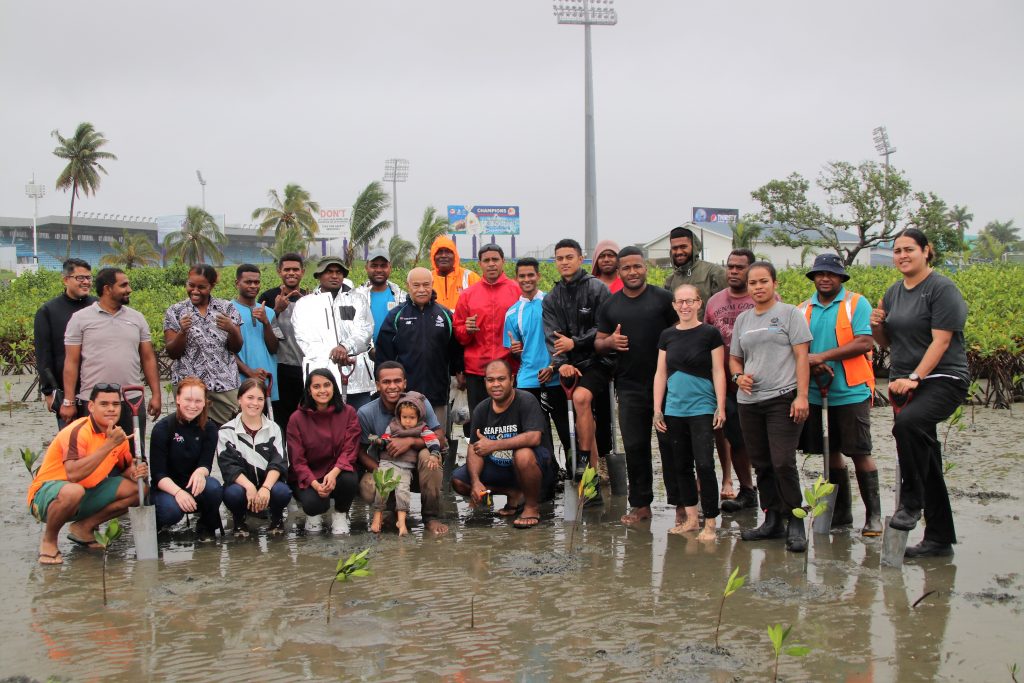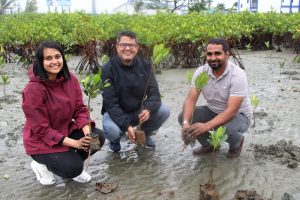

FNU staff, students and the members of the public after planting mangrove trees along the Nasese foreshore.
The Fiji National University’s (FNU) College of Engineering, Science and Technology (CEST) has taken a proactive stance in safeguarding the coastal ecosystem by embarking on a significant initiative.
The staff, students and members of the community teamed up on a rainy and chilly morning to contribute towards the noble cause of planting 300 mangrove seedlings along the Nasese foreshore.
The initiative stands as a formidable shield against the encroaching challenges posed by coastal erosion and the escalating impacts of climate change. Planting mangrove trees emphasised FNU’s dedication to sustainable practices and highlights the University’s vital role in protecting the environment.
CEST Assistant Professor, Dr Harshna Charan, who organised the initiative, said the programme will help to protect the coastal area from cyclones.
“I am thankful to all the people who came out to be part of the mangrove tree planting initiative despite the adverse weather condition. The commitment from the people shows that they care for the environment, and they are good ambassadors who want to protect the environment from climate change including the sea-level rise. This initiative instils a sense of pride and responsibility for our land and sea,” Dr Charan said.

FNU staff, students and the members of the public after planting mangrove trees along the Nasese foreshore.
“Mangroves provide critical habitats for a diverse array of species, including fish, crustaceans, molluscs, and birds. These ecosystems support intricate food webs, serving as breeding grounds, nurseries, and feeding areas for numerous marine and terrestrial species. The preservation and restoration of mangroves are integral to maintaining overall biodiversity and empowering our community.”
Fiji National University’s mangrove planting initiative contributes towards the United Nation’s Sustainable Development Goal 3— Good Health and Well-being, Goal 13– Climate Action, Goal 14—Life Below Water and Goal 15— Life On Land.
Mangrove planting initiatives contribute to environmental sustainability and the health of coastal ecosystems. By protecting coastlines from erosion, absorbing carbon dioxide, and providing habitats for various species, mangroves play a crucial role in maintaining ecological balance. The initiative will protect the people from natural disasters as mangroves act as natural buffers against tsunamis and provide livelihood and food safety.
The mangroves also help improve the air quality by sequestering carbon dioxide and other pollutants. They also filter and purify water, benefiting both environmental and human health.
Fiji Maritime Academy Executive Officer and part-time TVET Lecturer, Mohammed Taslim, said mangrove trees significantly benefit maritime communities, contributing to improved safety, livelihoods, and overall well-being.
“Mangroves support vibrant fisheries, offering access to abundant seafood resources. This can be particularly beneficial for fishing fleets and maritime communities that depend on fishing for sustenance and income,” Taslim said.
“The planting and preservation of mangrove trees provide a range of advantages to seafarers, from enhanced safety and navigational aids to improved marine biodiversity and livelihood opportunities. These coastal ecosystems play a vital role in supporting the well-being of maritime communities and ensuring sustainable and resilient marine environments.”
Canadian students, Jordan Weatherill and Helen Martin, who are studying at FNU as part of Insight Global Education (IGE), were also present and contributed towards the initiative.
“It was an amazing experience, especially in the rainy weather, as most of them came out to be part of the mangrove planting. Coastal erosion is a big problem, and mangroves are important habitat for marine and terrestrial environments” to “important habitat for marine and terrestrial species,” Weatherill said.
Martin also shared the same sentiments emphasising the importance of protecting the natural environment.
“Ministry of Forestry, students, members of the public and the FNU academia came together for the great initiative, and Fiji has been playing a key role in the fight against climate change,” she said.
“I am amazed by the unity of the people who turned up to plant mangroves, which shows the true spirit of the Pacific Island countries.”